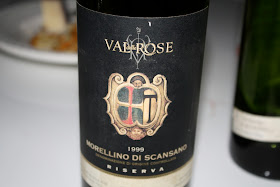As everyone knows, there are two acceptable occasions to open a 1975 Mouton Rothschild: 1) When eating a McRib, and 2) Any Wednesday that you feel like it. Tracie and I joined Tim for the latter.
We talked about the relatively low alcohol percentage. Tim explained: "People don't understand Bordeaux because their palates are f****d up from drinking big California wines." (He then went on to share his thoughts on Robert Parker's "burned-out palate" and how it has influenced the entire world of wine.)
See, this... this is why we call Tim the Cork Whisperer. I make a bigger mess opening a screw-cap bottle of wine than he did with this Bordeaux that was older than I am.
The wine was good. Very good.
Following up the Mouton with an 11 year-old Treana sounded like it would be an unavoidable disappointment, but it was not.
We had three kinds of cheese with the wines. You will read more about these two soon.
Some of the others we sampled.
This post is pretty short, I know. There will be a big one tomorrow.










EUREKA! Tim has hit the nail on the head! I am not a fan of huge California wines particularly because they ARE so huge and punchy!
ReplyDeleteYou guys always have so much fun!
ReplyDeleteWOW! 1975. I hope to one day get a wine with my birth date.. 1980.
ReplyDeleteOn my 30th birthday Tim gave me a bottle of '78 (my birth year) cab and it was awesome.
ReplyDeleteMy two favorite people were born in 1980 but if I get three bottless of '80 Mouton, I will give you one.
@ BW: (yes, I'm Tim) I have a bottle or two of 1980 Mouton Rothschild, but unfortunately, it was a MUCH better year for people than for wine. There are some mighty fine vintage Ports from 1980 though, and they are ready to enjoy now!
ReplyDelete@ Nick: I have seen the film. Although he explains himself, he is almost single-handedly responsible for the the change in winemaking philosophies in the 1980's - practices that endure today: high sugar extracts which produce wines that are higher in in alcohol, lower in natural fruit acids and not nearly as balanced or ageable as the wines that preceded his influence. He assigned number ratings, which were not a new concept, but expanded the scale from 0-10 to 0 to 100. He has never (to my knowledge) scored a wine below 50 points, which is an enigma in itself. Why would one create a scoring system which actually begins at 50 points (virtually) and dissects "quality" into such finite bits? Is a wine which scored 84 really that much better than one which scored 82? It turned the world of professional wine criticism from a world of words (read Decanter Magazine for some "old school reviews) into a world of numbers, and consumers bought it lock, stock and barrel. There are now multitudes of consumers that read his newsletters (as well as Wine Spectator, the People Magazine of the wine world, and also employs the 100 point scale) and will NOT buy a wine which has not given 90 points or above.
I'm not knocking your remark, I merely want to add some breadth to its substance.
There is a trend among conscientious wine producers now that will hopefully bring California winemaking back to a level of balanced and ageable products that we can enjoy now - OR lay down for 10+ years without having to worry about them tasting like bad Port when consumed.
I hope Justin's readers will forgive my rant, but as as practitioner in the wine biz for more than 25 years, I can't help but to have a passionate opinion or two. Tim
I like wines that are no more than five bucks per quart. Also I like wines that are only sold by the quart.
ReplyDeleteBut some of my friends are more erudite than I.